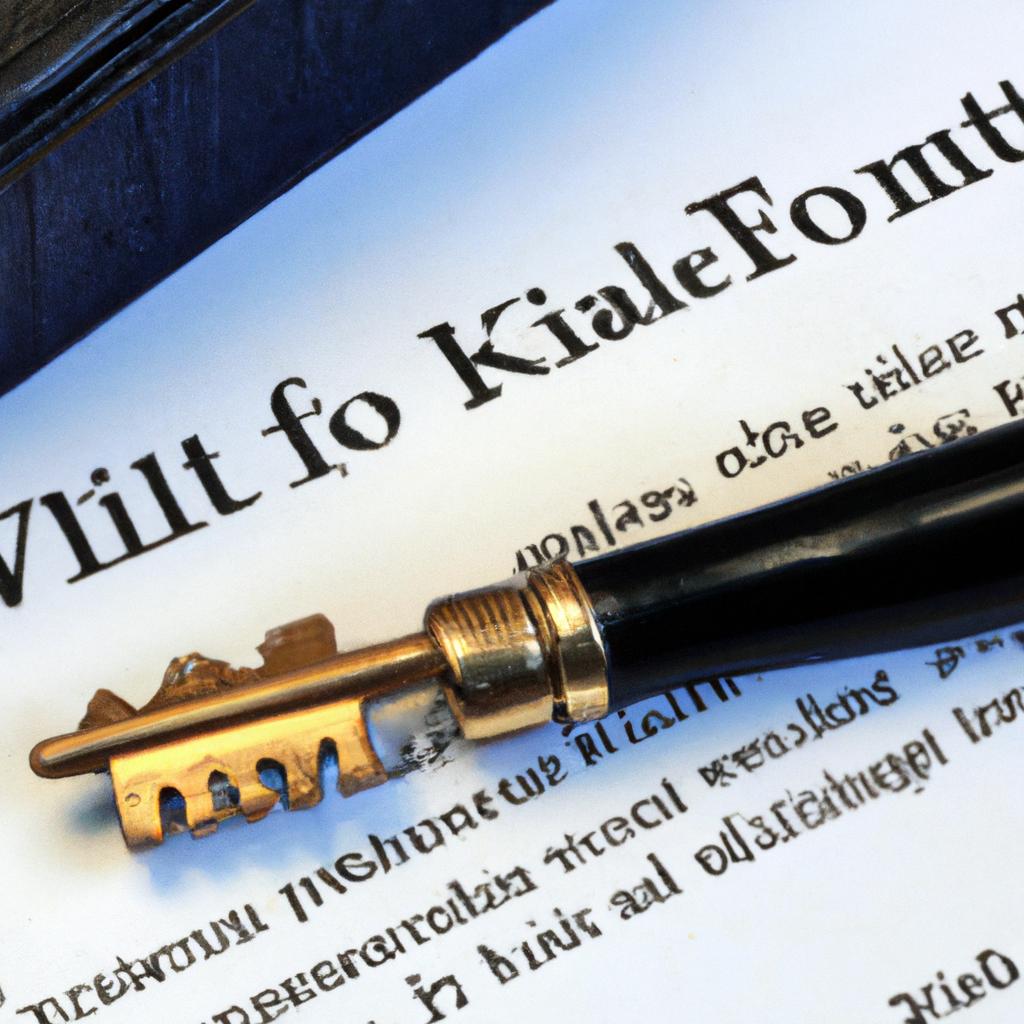In the intricate web of estate planning, the concept of probating a will often elicits confusion and uncertainty. As experienced legal professionals at Morgan Legal Group in New York City, we understand the complexities surrounding this crucial process. In this article, we aim to shed light on the question that lingers in the minds of many: Do you need to probate a will? Let us break down the key considerations and potential implications to guide you through this important decision-making process.
Do You Need to Probate a Will? Understanding the Probate Process in New York
Probate is the legal process of proving the validity of a deceased person’s will in court. In New York, the probate process can be complex and time-consuming. Whether or not you need to probate a will depends on a variety of factors, including the size of the estate, the types of assets involved, and whether there are any disputes among beneficiaries.
Understanding the probate process in New York is essential for anyone who has been named as an executor in a will or who is a beneficiary of an estate. At Morgan Legal Group, we specialize in estate planning and probate law and can help guide you through the probate process. Our experienced team of probate attorneys can assist with everything from filing the necessary paperwork to representing you in probate court.

Key Considerations When Deciding Whether to Probate a Will
When considering whether to probate a will, there are several key factors to take into account. One important consideration is the value of the assets in the estate. If the estate includes significant assets such as real estate, investments, or valuable personal property, it may be necessary to go through the probate process to ensure that these assets are properly distributed according to the terms of the will.
Another factor to consider is the complexity of the estate. If the estate is straightforward and all beneficiaries are in agreement, probate may not be necessary. However, if there are disputes among beneficiaries, creditors making claims against the estate, or complex legal issues to resolve, probate may be the best course of action to ensure that the estate is properly settled. Ultimately, consulting with an experienced estate planning attorney can help you determine whether probate is necessary in your particular situation.

Benefits of Probating a Will: Ensuring Legal Transfer of Assets
Probating a will is a crucial step in ensuring the legal transfer of assets from a deceased individual to their beneficiaries. By going through the probate process, you can be confident that the distribution of assets is being handled in accordance with the law and the wishes of the deceased. This can provide peace of mind to both the deceased’s loved ones and the beneficiaries.
Some benefits of probating a will include:
- Clear Transfer of Assets: Probate ensures that assets are transferred to the rightful beneficiaries according to the terms of the will.
- Creditor Protection: Probate provides a transparent process for creditors to make claims against the estate, protecting the beneficiaries from unexpected debts.
- Dispute Resolution: Probate can help resolve any disputes that may arise between family members or other interested parties regarding the distribution of assets.

Expert Guidance: Consultation with an Estate Planning Attorney for Probate Assistance
When it comes to handling the probate process, consulting with an estate planning attorney can provide you with expert guidance every step of the way. Probate assistance is crucial in ensuring that the deceased’s assets are properly distributed according to their wishes and in compliance with state laws. An estate planning attorney can assist you in navigating the complex legal procedures involved in probate, including filing the necessary documents, resolving disputes, and managing creditors’ claims.
During a consultation with an estate planning attorney, you can expect to receive personalized advice tailored to your specific situation. From determining if probate is necessary to guiding you through the probate process, an attorney can help you make informed decisions that protect your loved one’s legacy. By seeking professional assistance, you can avoid costly mistakes and ensure that the probate process runs smoothly and efficiently.
Q&A
Q: What does it mean to probate a will?
A: Probating a will is the legal process of proving its validity in court.
Q: Is it always necessary to probate a will?
A: Not always. If the estate is small and does not include real estate, probate may not be required.
Q: Why would someone choose to probate a will?
A: Probating a will ensures that the deceased’s assets are distributed according to their wishes and can help resolve any disputes among beneficiaries.
Q: How long does the probate process typically take?
A: The length of the probate process can vary depending on the complexity of the estate, but it usually takes several months to a year to complete.
Q: What happens if a will is not probated?
A: If a will is not probated, the deceased’s assets will be distributed according to state laws, which may not align with the deceased’s wishes.
Q: Can probate be avoided altogether?
A: Yes, there are certain estate planning strategies, such as creating a trust, that can help assets avoid probate.
Q: What steps should be taken to probate a will?
A: To probate a will, the executor must file the necessary documents with the court, notify beneficiaries and creditors, and distribute assets according to the will’s instructions.
Key Takeaways
In conclusion, understanding the complexities of probate can help ensure that your loved one’s final wishes are carried out smoothly. Whether or not you need to probate a will ultimately depends on a variety of factors, including the size of the estate and state laws. Consulting with a legal professional can provide you with the guidance and support you need during this sensitive time. Remember, probate may seem daunting, but with the right help, it can be a manageable process.
 DO YOU NEED TO PROBATE A WILL – UNDERSTANDING THE PROCESS AND ITS IMPORTANCE
DO YOU NEED TO PROBATE A WILL – UNDERSTANDING THE PROCESS AND ITS IMPORTANCE
When a loved one passes away, they often leave behind various belongings and assets that need to be distributed among their family members and beneficiaries. In order to ensure that this process is carried out smoothly and according to the wishes of the deceased, a legal process called probate may be necessary. While many people have heard of probate, they may not fully understand what it entails or if it is even necessary. In this article, we will delve into the details of probate and answer the question, “do you need to probate a will?”
What is Probate?
Probate is the legal process of validating a deceased person’s will and executing it according to their stated wishes. It involves the court-supervised distribution of assets to the beneficiaries named in the will. In some cases, assets may need to be liquidated in order to cover debts and taxes. The probate process also involves the appointment of an executor, who is responsible for managing the estate.
Do You Need to Probate a Will?
The short answer is – it depends. The need for probate varies from state to state and depends on the unique circumstances of each individual case. In some situations, probate may not be necessary at all. Let’s take a closer look at when probate may or may not be required.
When Probate May Not Be Required:
1. Small Estates: If the deceased had a relatively small estate, their assets could potentially be distributed without going through probate. Each state has its own definition of what constitutes a small estate, but generally, it refers to estates with a value under a certain threshold.
2. Assets with Beneficiary Designations: Certain assets, such as life insurance policies, retirement accounts, and bank accounts, may already have designated beneficiaries. In these cases, the assets will be distributed to the named beneficiaries without having to go through probate.
3. Jointly Owned Assets: If the deceased owned assets jointly with another person, such as a spouse or business partner, those assets may automatically pass on to the surviving owner.
When Probate May Be Required:
1. When a Will Exists: Wills are legal documents that outline how a person wishes their assets to be distributed after their death. If there is a will, it will most likely need to go through probate to be validated and executed.
2. When There is No Will: If a person dies without a will, they are said to have died intestate. In this case, the court will determine how the assets will be distributed according to the state’s laws of intestacy. This process will involve probate.
3. Disputes among Beneficiaries: If there are any disputes among beneficiaries or potential heirs, the court will need to resolve them during the probate process.
Benefits and Practical Tips:
While probate can seem like a daunting and time-consuming process, there are some benefits to going through it. Firstly, it ensures that the deceased’s assets are distributed as per their wishes, avoiding any potential for disputes or conflicts among loved ones. Additionally, probate provides a legal framework for managing and distributing assets, reducing the risk of fraudulent claims. It also provides an opportunity for creditors to come forward and make any claims against the estate, protecting the beneficiaries from future creditors.
If you find yourself in the difficult situation of having to manage the probate process, there are a few tips that can help make it smoother:
1. Consult with an attorney: Probate laws can be complex, and having an experienced attorney to guide you through the process can be invaluable. They can also ensure that all legal requirements are met, avoiding any delays or challenges.
2. Keep detailed records: As an executor, you will be responsible for managing the estate’s assets and expenses. Keeping detailed records will help you accurately account for all transactions and prevent any potential disputes.
3. Communicate with beneficiaries: It is important to keep all beneficiaries informed about the probate process and any decisions that need to be made. This will help avoid any misunderstandings or conflicts.
Real-Life Examples:
To gain a better understanding of how probate works in real life, let’s look at a few examples.
Case Study 1: John passes away, leaving behind a will that outlines his desires to leave his house to his son and his car to his daughter. In this case, the will would go through probate to be validated, and the assets would be distributed accordingly.
Case Study 2: Sarah dies without a will, leaving behind a husband and two young children. In this scenario, the court would have to determine how to distribute her estate according to the laws of intestacy. This process would involve probate and could potentially result in her assets being distributed in a way that may not align with her wishes.
First-Hand Experience:
“I recently had to go through the probate process after my father passed away. While it was initially overwhelming, having an attorney to guide me and my siblings through it made all the difference. It gave us peace of mind knowing that everything was being handled legally and fairly.”
In Conclusion:
In summary, while the probate process may seem overwhelming and intimidating, it plays a vital role in ensuring that a person’s assets are distributed according to their wishes. Whether or not you need to probate a will depends on various factors, and it is best to seek legal advice to determine if it is necessary in your situation. By understanding the probate process and following some practical tips, you can navigate this process smoothly and ensure that your loved one’s final wishes are carried out.

